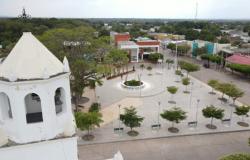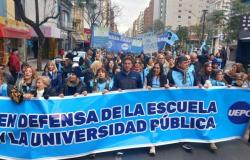
Community-based groups met at the University of O’Higgins to share cultural experiences in a dissemination meeting. There are already 14 organizations that are part of the initiative promoted by the Ministry of Cultures.
Experiences from the territory, associativity and collective work networks. These were some of the topics that were developed at the Dissemination Meeting of the Community Culture Points Program (PCC), promoted by the Seremi of Cultures, Arts and Heritage in collaboration with the University of O’Higgins. The event sought to invite new community-based organizations to join the national initiative.
The Seremi of Cultures, Arts and Heritage of O’Higgins, Cristo Cucumides Litin, highlighted the activity, indicating that “we know that in the region there are different organizations that are working in neighborhoods and communities, and there is important work of management; For this reason, we want to reach those spaces through the Community Culture Points Program, with the aim of providing support so that this management continues and is strengthened.”
Along these lines, he added that “we were able to listen to the experience of three community groups that have already been validated as PCC and we want this network to continue expanding, through the registration and validation of new groups and cultural spaces in the region, so that they can have access to training, technical advice, and exclusive calls for the financing of their management plans.”
Meanwhile, Clemencia González, director of the Directorate of Culture, Heritage and Extension of the University of O’Higgins, indicated that this dissemination meeting “is a new space to disseminate not only the contents and programs that we are developing during the year , but also a space to learn about the experience of the Culture Points that have already been developing during the year, so we have been surprised with such diverse sociocultural experiences, from Pichilemu, Rancagua and San Fernando, that continue to encourage and motivate us to work in this beautiful program.”
He also highlighted “this virtuous alliance that the Ministry of Culture proposed with the State universities, to become agents of development in each territory. Thanks to this initiative, each of the regional universities have joined together to collaborate in the development of this program, which contributes to strengthening the community work of the Culture Points. I consider that this alliance is essential to promote cultural development at the local level.”
Three important territorial organizations from the O’Higgins Region were presented at the meeting, and they spoke about their work with communities and experiences with the Culture Points program. Cadudzzi Salas, representative of the Pichilemu Sustainable Development Center, was present; Francisca Jara, cultural manager and creative director of the Impronta Theater Company; and Bastián Apablaza and Cristian Palominos from the Radio Aukán Group of San Fernando.
In this regard, Francisca Jara, from Teatro Impronta, stated that “here we explain how we have managed to generate a work methodology financed through this wonderful Community Culture Points Program, which allows us to link up with other cultural agents deployed in the territories, many times in highly complex spaces where the State does not usually reach. We make ourselves available, as a vehicle that connects the structure of opportunities to these spaces, and allows us to democratize these resources and value the work of both these organizations located in these territories and the theater company, exchanging and highlighting what it already exists. We hope that these types of instances continue to be repeated.”
Meanwhile, Bastián Apablaza, from Radio Aukán, pointed out that “this year that we have been a Community Culture Point, being able to implement our strengthening plan, has allowed us to give greater consistency to our management work in the space where we are and fundamentally in The articulation with other groups in the region, which, like us, maintain a radio station, also allows us to open a communication window to disseminate what these other organizations are doing in their territories. The meeting was interesting especially in the sense of being able to make these presentations to other organizations that are in the process of being part of Punto de Cultura.”
Cadudzzi Salas from the Pichilemu Sustainable Development Center commented that “for our organization it is a meeting space with the cultural social organizations of the region, it is a meeting between peers where we provide feedback on our actions. The Strengthening program has allowed us to revitalize our organization by expanding membership and implementing knowledge transfer and good organizational practices. “We are overcoming the effects of the pandemic and redefining our strategy and its actions.”
The activity headed by the Seremi of Cultures, Arts and Heritage of the O’Higgins Region, Cristo Cucumides Litin, and the director of Culture, Heritage and Extension of the University of O’Higgins, Clemencia González, was attended by presence of the head of the Department of Cultural Citizenship of the Undersecretary of Culture and the Arts, Marianela Riquelme, and the professional of Community Culture Points, Andrea Castellón.
Through Culture Points, the State recognizes and validates the work that, for years, organizations, groups and organized communities, linked to artistic, cultural and heritage, have developed, contributing to their sustainability and strengthening the development of local cultures.
The Community Culture Points registry is still open on the website www.puntos.cultura.gob.cl





